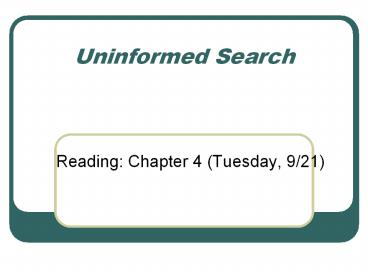Uninformed Search - PowerPoint PPT Presentation
Title:
Uninformed Search
Description:
For what games, do we do this? Search = 'mental exploration of possibilities' ... 8 Puzzle. States: integer locations of tiles (0 1 2 3 4 5 6 7 8) (0 1 2)(3 4 5) ... – PowerPoint PPT presentation
Number of Views:38
Avg rating:3.0/5.0
Title: Uninformed Search
1
Uninformed Search
- Reading Chapter 4 (Tuesday, 9/21)
2
Uninformed
- Search through the space of possible solutions
- Use no knowledge about which path is likely to be
best - Exception uniform cost
- Each path is given a cost
3
Characteristics
- Before actually doing something to solve a
puzzle, an intelligent agent explores
possibilities in its head - Human vs. rational?
- For what games, do we do this?
- Search mental exploration of possibilities
- Making a good decision requires exploring several
possibilities - Execute the solution once its found
4
Formulating Problems as Search
- Given an initial state and a goal, find the
sequence of actions leading through a sequence of
states to the final goal state. - Terms
- Successor function given action and state,
returns action, successors - State space the set of all states reachable from
the initial state - Path a sequence of states connected by actions
- Goal test is a given state the goal state?
- Path cost function assigning a numeric cost to
each path - Solution a path from initial state to goal state
5
Example the 8-puzzle
- How would you use AI techniques to solve the
8-puzzle problem?
6
8-puzzle URLS
- http//www.permadi.com/java/puzzle8
- http//www.cs.rmit.edu.au/AI-Search/Product
7
8 Puzzle
- States integer locations of tiles
- (0 1 2 3 4 5 6 7 8)
- (0 1 2)(3 4 5) (6 7 8)
- Action left, right, up, down
- Goal test is current state (0 1 2 3 4 5 6 7
8)? - Path cost same for all paths
- Successor function given up, (5 2 3 0 1 8 4 7
6) -gt ? - What would the state space be for this problem?
8
What are we searching?
- State space vs. search space
- State represents a physical configuration
- Search space represents a tree/graph of possible
solutions an abstract configuration - Nodes
- Abstract data structure in search space
- Parent, children, depth, path cost, associated
state - Expand
- A function that given a node, creates all
children nodes, using successsor function
9
(No Transcript)
10
Uninformed Search Strategies
- The strategy gives the order in which the search
space is searched - Breadth first
- Depth first
- Depth limited search
- Iterative deepening
- Uniform cost
11
Algorithm for Breadth-first
12
(No Transcript)
13
(No Transcript)
14
(No Transcript)
15
(No Transcript)
16
Visualization
17
Algorithm for depth-first search
18
(No Transcript)
19
(No Transcript)
20
(No Transcript)
21
(No Transcript)
22
(No Transcript)
23
(No Transcript)
24
(No Transcript)
25
(No Transcript)
26
Complexity Analysis
- Completeness is the algorithm guaranteed to find
a solution when there is one? - Optimality Does the strategy find the optimal
solution? - Time How long does it take to find a solution?
- Space How much memory is needed to perform the
search?
27
Cost variables
- Time number of nodes generated
- Space maximum number of nodes stored in memory
- Branching factor b
- Maximum number of successors of any node
- Depth d
- Depth of shallowest goal node
- Path length m
- Maximum length of any path in the state space
28
ComplexityBFS vs. DFS
- Optimal?
- Time
- Space
- Complete?
- Optimal?
- Time
- Space
- Complete?
29
Can we combine benefits of both?
- Depth limited
- Select some limit in depth to explore the problem
using DFS - How do we select the limit?
- Iterative deepening
- DFS with depth 1
- DFS with depth 2 up to depth d
30
(No Transcript)
31
(No Transcript)
32
(No Transcript)
33
Three types of incompleteness
- Sensorless problems
- Contingency problems
- Adversarial problems
- Exploration problems































